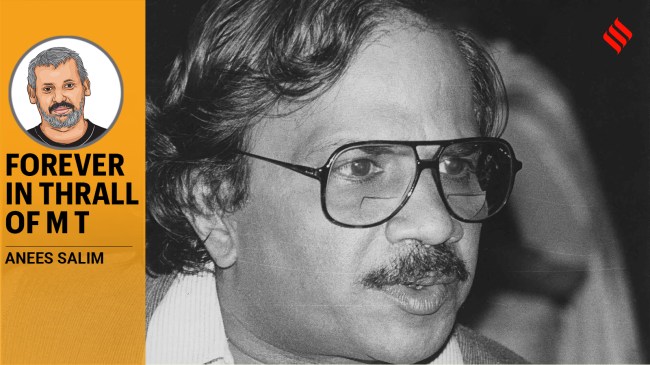Opinion For Malayalis, M T Vasudevan Nair conjured up fascinating worlds
In the coming days, hundreds of eulogies will be written on MT. But his contributions cannot be limited to what he wrote, how he tantalised millions of readers with his craft. He also introduced world literature to Malayalis
 M T Vasudevan Nair
M T Vasudevan Nair Every time our ancestral home got painted, which was usually every fourth or fifth year, a stack of letters, secured with a red rubber band, would come out of a drawer, otherwise kept under lock and key. The letters were my father’s most prized possessions, written by the living legends of Malayalam literature. Some were long, some were short, some were even curt, but all the letters had something in common, they were written in untidy hands, nearly impossible to decipher. The most difficult-to-read ones, four of them, came from a writer called M T Vasudevan Nair, and in my childhood, I used to wonder how a man with such a complicated handwriting could have written so many books, each of which was bound and kept in our home library, treated with complete reverence as if they were scriptures. Once the paint on the walls and wood dried, the letters would be slipped back into the drawer and the lock would click in. They would stay out of sight until it was time for the painters to turn up again.
I started reading M T when I was 15, and the first book I read was about a man travelling to his ancestral home to pay his last tribute to his father. I picked up the book on the eve of my board exams and slipped it inside my Malayalam textbook. Halfway through the protagonist’s memories about his father, mine walked into the room and forced the textbook out of my hands. His face changed when he found another book inside, which he picked up and looked critically at. For a long moment nothing else happened. Then he gave the novel back to me and walked out of the room with the textbook. At that moment, it looked odd, it even felt like the highest form of ridicule. But later, I began to suspect my father was giving me a message by leaving the novel with me and taking my learning material away: If you want to be a writer, you are doing the right thing. You have enrolled into the best university in the world. When I heard about my father’s passing, I remembered that night, and when I heard about M T’s demise, I remembered that night again.
I was probably one of the few writers living in Kerala who neither met M T nor heard him speak at a public function. I just read him, and heard his lines quoted just before lovers separated. Many decades ago, I stood outside the newspaper office where he worked as the editor, gathering courage to go up a few flights of stairs and request an audience with him. But I was terrified at the prospect of meeting the titan, and finally left his city after a long look at what I assumed to be his window. More recently, someone reassured me that he knew of my existence, and I should pay him a visit; he warned me that time was running out. I knew time was fast running out, and I almost asked my friend to request for an appointment, but soon I realised that I was still terrified of meeting him, that I was still the fledgling who once stood under his window, trembling and sweating.
In the coming days, hundreds of eulogies will be written on M T, in remembrance of his contributions to Malayalam literature and cinema. But his contributions cannot be limited to what he wrote, how he tantalised millions of readers with his craft. He also introduced world literature to Malayalis. I am told that it was through M T that Malayalis first heard the name of Gabriel Garcia Marquez, and for Malayalis he is no less than Marquez himself.
As I am fond of saying, when a writer dies, a reader is born. I can see a new generation of readers picking up his books and discovering the world M T created with his magic wand filled with indelible ink. The first thing I did upon hearing about his death was to read something he wrote, not a book but a letter he wrote some 40 years ago (some of the letters had changed hands and one of them ended up in my collection). The passing years didn’t turn his handwriting into copperplate, but it suddenly appeared much friendlier to the eye, much dearer to its owner. As I put the letter back and locked the drawer, I asked myself, but when are we going to meet, maestro? Someday, on the other side.
Salim is a Kochi-based author, most recently of, The Bellboy






